May 21, 2009
extract images from pdf
command is pdfimage -j picturefilename
type in terminal
for eg: pdfimage -j suresh
you will get suresh-001 suresh-002 as image files.
Feb 1, 2009
flash.ocx
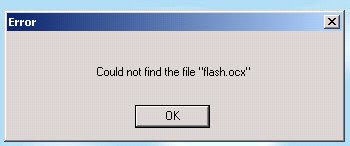
In windows you may get a frequent error "flash.ocx" file not found like this
You will need to find the flash9.ocx file and copy it as the file flash.ocx. (or download the attached flash.ocx)
To do this:
1. Browse to the C:\Windows\System32\Macromed\Flash folder.
2. Locate the flash9.ocx file and right click it and select copy.
3. Right click in a blank spot of the same folder and select paste.
4. You will then find you have a file called Copy of Flash9.ocx in the folder.
5. Right click the new file and select rename and rename to flash.ocx
Once complete you should notice your screensaver functioning again and the error long gone.
Reference
http://www.techenigma.com/articles/1741/1/Could-not-find-the-file-flashocx/Page1.html
Jan 28, 2009
Software for deciding journal for publication
Rather than racking your brain to decide which journal is most likely to publish your work, the computer program – called Journal/Author Name Estimator or Jane –will take a paper’s title or abstract and tell you where to take it.
check it out this blog for further information http://blogs.nature.com/news/thegreatbeyond/2008/03/picker_produces_paper_publicat.htmlDec 2, 2008
Interview questions - phd or post doc
1. What characteristics distinguish this program from others in the same field ?
2. Tell me abt yourself ? 3. What are your strengths and weakness ? 4. If your are not accepted into graduate school ? What are your plans ?
5. Why did you choose this career ?
6. What do you know about our program ? / Why did you choose to apply to our program ? 7. What do you believe your greatest challenge will be if you are accepted into this program ?
8. In college, what courses did you enjoy the most? The least ? Why?
9. How would your professors describe you?
10. How will you be able to make a contribution to this field?
11. What are your hobbies?
12. Explain a situation in which you had a conflic and how you resolved it. What would you do differently? Why? 13. Describe your greatest accomplishment?
14. Tell me about your experience in this field? What was challenging? What was your contribution?
15. What are your career goals? How will this program help you achieve your goals ? 16. What skills do you bring to the program. How will you help your mentor in his or her research ? / Why should we take you and not someone else? / In what ways have your previous experience prepared you for graduate study in our program ?
17. Are you motivated? Explain and provide examples. 18. What do you plan to specialize in ? 19. What can be determined about an applicant at an interviews?
20. Has anything ever irritated you about people you have worked with?
21. Is there anyone you just could not work with?
22. Would you rather be liked or feared ?
23. What has been the biggest obstacle you have overcome? 24. By what process do you make decisions?
25. What do you do when you are right and others disagree with you? 26. How would you supervise a postgraduate researcher?
27. Who are the key researchers in your field? 28. What are the most important rewards you expect in your career? 29. how do you determine or evaluate success?
28. How do you want to see you in next 10 years?
29. Basic scientific questions in your area?
Oct 29, 2008
Prediction of Protein Structure In 1D - Secondary Structure, Membrane Regions, and Solvent Accessibility
Burkhard Rost
Structural Bioinformatics, P Bourne & H Weissig (eds.), Wiley, 2007, in press
http://cubic.bioc.columbia.edu/papers/2008_rev_1dpred/paper.html
Free English/metric conversion software
Oct 18, 2008
Free education online
Oct 16, 2008
Free online MIT Courses
Nobel Week
Every year since 1901 the Nobel Prize has been awarded for achievements in physics, chemistry, physiology or medicine, literature and for peace. The Nobel Prize is an international award administered by the Nobel Foundation in Stockholm, Sweden. In 1968, Sveriges Riksbank established The Sveriges Riksbank Prize in Economic Sciences in Memory of Alfred Nobel, founder of the Nobel Prize. Each prize consists of a medal, personal diploma, and a cash award
Why is the Nobel Peace Prize awarded in Oslo and all the other Nobel Prizes in Stockholm?
Alfred Nobel left no explanation as to why the prize for peace was to be awarded by a Norwegian committee while the other four prizes were to be handled by Swedish committees. In the will he wrote:
"The prizes for physics and chemistry shall be awarded by the Swedish Academy of Sciences; that for physiology or medical works by the Karolinska Institute in Stockholm; that for literature by the Academy in Stockholm, and that for champions of peace by a committee of five persons to be elected by the Norwegian Storting."
Why do you use the word Nobel Laureate and not Nobel Prize Winner?
The awarding of the Nobel Prizes is not a competition or lottery, and therefore there are no winners or losers. Nobel Laureates receive the Nobel Prize in recognition of their achievements in physics, chemistry, physiology or medicine, literature, or peace.
Nobel Prize amount
10000000(sweden kronor) = 6,71,54,875 (Indian rupees) [in 2007]
Nobel Laureates Facts (2007)
807 Nobel Laureates!
787 individuals and 20 organizations have been awarded the Nobel Prize. Some Laureates and organizations have been awarded more than once.
Only 35 women!
35 Nobel Laureates have been women, and the remaining 752 were men.
The youngest Nobel Laureate
To date, the youngest Laureate is Lawrence Bragg, who was just 25 years old when he received the Nobel Prize in Physics with his father in 1915.
The oldest Nobel Laureate
The oldest Laureate to date is Leonid Hurwicz, 2007 Economics Laureate, who is 90 years old.
Which person or organization has received the Nobel Prize more than once?
Marie Curie received the 1903 Nobel Prize in Physics, and the 1911 Nobel Prize in Chemistry;
John Bardeen received the 1956 and the 1972 Nobel Prize in Physics;
Frederick Sanger received the 1958 and the 1980 Nobel Prize in Chemistry;
Comité International de la Croix Rouge received the 1917, 1944 and 1963 Nobel Peace Prize;
Office of the United Nations High Commissioner for Refugees received the 1954 and the 1981 Nobel Peace Prize;
Linus Pauling received the 1954 Nobel Prize in Chemistry and the 1962 Nobel Peace Prize.
Who is the only person to have been awarded two unshared Nobel Prizes?
Linus Pauling was awarded the 1954 Nobel Prize in Chemistry and the 1962 Nobel Peace Prize.
The Nobel Peace Prize 2008
conflicts"
Name : Martti Ahtisaari
Country: Finland

The Nobel Prize in Literature 2008
Country : France
"author of new departures, poetic adventure and sensual ecstasy, explorer of a humanity beyond and below the reigning civilization"
 |
The Nobel Prize in Physiology or Medicine 2008
 |  |  |
| Harald zur Hausen | Françoise Barré-Sinoussi | Luc Montagnier |
|---|---|---|
| Germany | France | France |
| German Cancer Research Centre Heidelberg, Germany | Regulation of Retroviral Infections Unit, Virology Department, Institut Pasteur Paris, France | World Foundation for AIDS Research and Prevention Paris, France |
The Nobel Prize in Chemistry 2008
 |  |  |
| Osamu Shimomura | Martin Chalfie | Roger Y. Tsien |
|---|---|---|
| USA | USA | USA |
| Marine Biological Laboratory (MBL) Woods Hole, MA, USA | Columbia University New York, NY, USA | University of California San Diego, CA, USA |
The Nobel Prize in Physics 2008
 |  |  |
| Yoichiro Nambu | Makoto Kobayashi | Toshihide Maskawa |
|---|---|---|
| USA | Japan | Japan |
| Enrico Fermi Institute, University of Chicago Chicago, IL, USA | High Energy Accelerator Research Organization (KEK) Tsukuba, Japan | Kyoto Sangyo University; Yukawa Institute for Theoretical Physics (YITP), Kyoto University Kyoto, Japan |
Nobel prize in Economics 2008
 |
| Princeton University USA |
Reference : http://nobelprize.org/index.
Oct 15, 2008
Oct 3, 2008
Proteopedia
Sep 24, 2008
Web link reference manager
Useful one check it out this http://www.connotea.org/ and sign up (similar to mail sign up) and make use of it.
Sep 23, 2008
Vadlo - Search engine for research scholar
Sep 12, 2008
Protein crystallography
Check it out this site, if you are interested in protein crystallography http://proteincrystallography.org/
Aug 30, 2008
AIGore Nobel Lecture
http://nobelprize.org/nobel_prizes/peace/laureates/2007/gore-lecture_en.html
Aug 26, 2008
The softer side of science
Mastering soft skills helps master one's career.
Scientists should shield themselves from discouraging events and develop a 'frustration tolerance' for paper and grant rejections, criticism by well-meaning colleagues and the depressing tedium of data collection. Then there's hypermotivation. To avoid burn-out, try relaxation (sports, yoga, meditation) and a healthy social life. Just as learning requires a quiet consolidation phase to store material in long-term memory, success in science needs intermittent silence.
Personality traits cannot usually be changed, but there are ways to improve one's disposition in the lab. Perfection, for example, can only be expected in pure mathematics or fairy tales. Beware of the 80–20 rule: for perfection, the last 20% of a task may take 80% of the effort — not a wise choice if you want to be productive. Worse, perfectionism is a sure path to leaving projects or papers incomplete.
A related trap is failure to bring a project to publication. A finished experiment may satisfy your curiosity, but data are only of value to your CV and the rest of the world if published. The drive to completion is healthy, if you wish to succeed in science. Many of us have papers that are 90% finished but never submitted. Consider the time you have already invested, how little is left to do and how much effort it would take to get to the same point with another project.
Writer's block can be a major challenge: sitting in front of a blank page, lacking the wherewithal to start writing. This may be linked to the perfectionist trap ("I do not write unless my text is perfect"), but it could also be the result of a lack of ideas, of writing ability or of self-confidence. It is usually the first 10 minutes of writing that are hardest. Try to start writing without worrying about the presentation or structure.
Scientific leadership qualities — exhibiting responsibility, flexibility and trust — are also essential in all aspects of science.
These seemingly simple tasks can be taxing. But improving soft skills is a critical element of science success.
From Nature magazine http://www.nature.com/naturejobs/2008/080529/full/nj7195-694b.html#top
Jul 24, 2008
retracted paper from india
I have gone through this paper recently which is retracted from India
RETRACTED: A computational docking study for prediction of binding mode of diospyrin and derivatives: Inhibitors of human and leishmanial DNA topoisomerase-I
Bioorganic & Medicinal Chemistry Letters, Volume 17, Issue 18, 15 September 2007, Page 5281
Sandeep Chhabra, Pooja Sharma, Nanda Ghoshal.
Reference : Bioorganic & Medicinal Chemistry Letters
Jun 7, 2008
Gromacs-tutorial
http://md.chem.rug.nl/education/mdcourse/MDpract.html
May 22, 2008
Research article with reviewers comment in Biologydirect
Various hypotheses on MHC evolution suggested by the concerted evolution of CD94L and MHC class Ia molecules. Biology Direct 2006, 1:3doi:10.1186/1745-6150-1-3
Profiles in science
This is the biographies of some scientist. It is interesting. Have a look at it.
How to setup a default application for a file(like word with Microsoft word)
text files with gedit or nedit
pdf files with acroread or xpdf
xml files with gedit or nedit
For example
I want all "xml" file types to openwith gedit (text editor).
Right click the file and select "Open with" "other application" you will get window like this (shown below). If you want to choose different editor choose the file types available.

Select the file type you want. I have selected gedit (text editor)

Now i can open all the "xml"(any application) files with gedit text editor
May 19, 2008
How to submit sequence in genbank (NCBI)
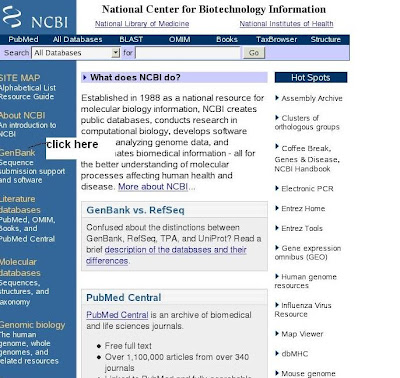 2)
2)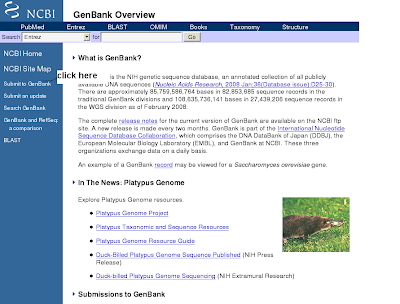
3)
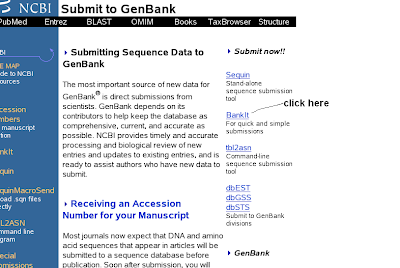 4)
4)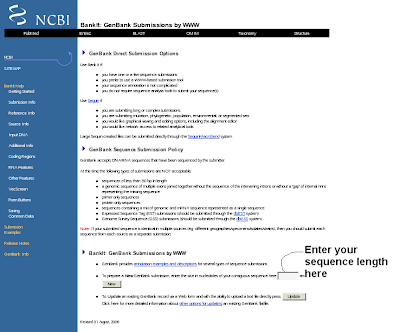
5)
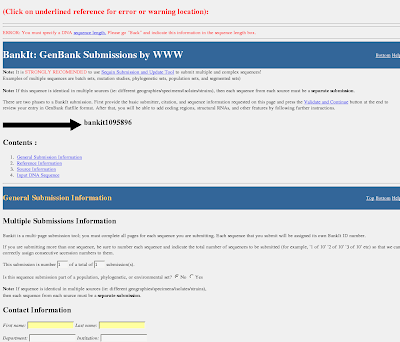
1) Open the NCBI home page (click genbank submission hyperlink)
2) You will get genbank overview(click submit to genbank)
3) You will get submit to genbank (clikc the right side BankIt)
4) You will get BankIt submission form (enter sequence length)
5)You can fill the BankIt sequence submission form
May 15, 2008
INSTALl-postgresql in linux
This is a little more complicated than installing Apache.
The best bet is to install from packages since this will make things easier, both now and for upgrades.
If you decide to install from source code, you'll need to create a user and compile the source.
Create a PostgreSQL user (you'll need root access). This is who owns the system. I use the "postgres" user and group, you can use something different but it's best to keep it related to the package.
See your system documentation on how to do this (hint - man useradd). Give the user a home directory of /usr/local/pgsql as this is where PostgreSQL defaults to when it installs.
Once all that is done, untar the source:
$ tar -zxf postgresql-
or
$ tar -xjf postgresql-
Jump into the directory:
$ cd postgresql-
(replace
Again, configure has a lot of help:
$ ./configure --help
We'll just install into /usr/local/pgsql and leave the rest as-is:
$ ./configure --prefix=/usr/local/pgsql
Next we have to make it (this will take a while, it takes longer than Apache):
$ make
You will get a line:
All of PostgreSQL successfully made. Ready to install.
when everything is finished.
You'll need to log in as root to do the rest:
$ su -
Go back to the postgresql directory and do:
# make install
PostgreSQL doesn't allow root to start up the server for security reasons, so next you'll have to change the owner of the files:
# chown -R postgres:postgres /usr/local/pgsql
Change to the postgres user:
# su - postgres
Then, change to /usr/local/pgsql:
$ cd /usr/local/pgsql
We need to initialize a database cluster:
$ bin/initdb -D ./data
This will create a /usr/local/pgsql/data directory and initialize it ready for startup and use.
As usual, you can view options by using the --help switch:
$ bin/initdb --help
Then you can start:
$ bin/pg_ctl -D ./data -l data/logfile start
Now that postgresql is started, we need to create a database and another user before we go any further.
You should use a separate database for each of our projects, it's not essential though - it just makes things a little cleaner and easier to understand.
You should also use separate users for each database. This keeps everything separate and 'project a' won't be able to modify any of 'project b's data.
To create a new user in postgresql, it's pretty simple:
$ /usr/local/pgsql/bin/createuser
and follow the prompts - pretty simple :)
The new user should not be able to create new databases or create new users.
To create a database, it's a little different.
$ /usr/local/pgsql/bin/createdb --owner=username databasename
We have to set the owner of the database when we create it, otherwise the 'postgres' user owns it and then we have to grant access to allow our new user to access it.
Now that that's all done, log out of the postgres user, so we're back as root. In the postgres directory, the contrib/start-scripts/ directory has a few system start up scripts
Useful installation instruction from http://www.designmagick.com/article/2/Starting-Out/Installing-PostgreSQL
This is a little more complicated than installing Apache.
The best bet is to install from packages since this will make things easier, both now and for upgrades.
If you decide to install from source code, you'll need to create a user and compile the source.
Create a PostgreSQL user (you'll need root access). This is who owns the system. I use the "postgres" user and group, you can use something different but it's best to keep it related to the package.
See your system documentation on how to do this (hint - man useradd). Give the user a home directory of /usr/local/pgsql as this is where PostgreSQL defaults to when it installs.
Once all that is done, untar the source:
$ tar -zxf postgresql-
or
$ tar -xjf postgresql-
Jump into the directory:
$ cd postgresql-
(replace
Again, configure has a lot of help:
$ ./configure --help
We'll just install into /usr/local/pgsql and leave the rest as-is:
$ ./configure --prefix=/usr/local/pgsql
Next we have to make it (this will take a while, it takes longer than Apache):
$ make
You will get a line:
All of PostgreSQL successfully made. Ready to install.
when everything is finished.
You'll need to log in as root to do the rest:
$ su -
Go back to the postgresql directory and do:
# make install
PostgreSQL doesn't allow root to start up the server for security reasons, so next you'll have to change the owner of the files:
# chown -R postgres:postgres /usr/local/pgsql
Change to the postgres user:
# su - postgres
Then, change to /usr/local/pgsql:
$ cd /usr/local/pgsql
We need to initialize a database cluster:
$ bin/initdb -D ./data
This will create a /usr/local/pgsql/data directory and initialize it ready for startup and use.
As usual, you can view options by using the --help switch:
$ bin/initdb --help
Then you can start:
$ bin/pg_ctl -D ./data -l data/logfile start
Now that postgresql is started, we need to create a database and another user before we go any further.
You should use a separate database for each of our projects, it's not essential though - it just makes things a little cleaner and easier to understand.
You should also use separate users for each database. This keeps everything separate and 'project a' won't be able to modify any of 'project b's data.
To create a new user in postgresql, it's pretty simple:
$ /usr/local/pgsql/bin/createuser
and follow the prompts - pretty simple :)
The new user should not be able to create new databases or create new users.
To create a database, it's a little different.
$ /usr/local/pgsql/bin/createdb --owner=username databasename
We have to set the owner of the database when we create it, otherwise the 'postgres' user owns it and then we have to grant access to allow our new user to access it.
Now that that's all done, log out of the postgres user, so we're back as root. In the postgres directory, the contrib/start-scripts/ directory has a few system start up scripts
Useful installation instruction from http://www.designmagick.com/article/2/Starting-Out/Installing-PostgreSQL
May 13, 2008
NCBI Resource Locator
The NCBI Resource Locator provides stable, uniform addressing for NCBI content, making it easy to link to individual records. Some NCBI resources also provide services (like search) through these URLs.
How does it work?
Each URL has the form
http://view.ncbi.nlm.nih.gov///
Where:
* is an NCBI resource (e.g., pubmed, gene, nucleotide, etc.)
* is the action to perform (e.g., search, get, etc.). If is missing, the default verb "get" is used.
* is data used by the action to perform the request
Some examples:
* http://view.ncbi.nlm.nih.gov/pubmed/12345
Show the PubMed record with pmid 12345
* http://view.ncbi.nlm.nih.gov/pubmed/search/cancer
Search PubMed for "cancer"
* http://view.ncbi.nlm.nih.gov/gene/search/human+p53
Search PubMed for "human p53"
* http://view.ncbi.nlm.nih.gov/homologene/search/dystrophin
Search Homologene for "dystrophin"
Reference http://view.ncbi.nlm.nih.gov/
unzip file(bz2,tar) files
use the command "tar -cvf filename.tar" for unzip the tar files
use the command "tar -xzvf filename.tar.gz for unzip the tar.gz files
How to transfer files using SCP in linux
scp filename username@hostname(or ip address):/home/user/ (path)
for eg, in my homology machine i use
scp filename suresh@homology:/home/suresh/